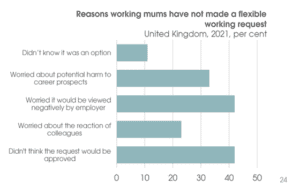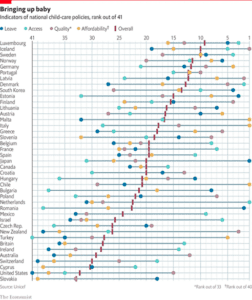Tackling childcare: the barrier stopping parents getting back to work
Comprehensive childcare policies that work for parents, businesses and economies alike.

Becoming a parent is an important milestone for many people. But in countries with limited childcare support for working parents, it can also be detrimental to their careers. A recent study of 4,000 women found that 67% believed their career progression was stilted by their childcare duties.
In light of the staggering impact lack of childcare can have on the economy, the UK government this week unveiled a $4 billion childcare expansion for one and two-year-olds, funding a plan that would provide 30 hours a week to parents.
In this article, we’ll explore why both working parents and businesses need comprehensive childcare policies, and what employers can do to support working parents at their organisation.
The benefits of introducing better childcare policies
Progressive childcare policies give parents the flexibility to decide which arrangements work best for them and their families. But there are also benefits for businesses and nations.
Boost the economy
In countries where it makes more financial sense to stay at home and look after your child than use childcare services, many parents choose not to re-enter the workforce until their child reaches school age. This creates labour shortages that hold back economic growth.
Offering enhanced childcare provision enables parents to go back to work while their child is still young. This creates a more active workforce that stimulates the economy.
Better staff retention
According to a report by FlexAppeal, three in five parents said working for a flexible, family-friendly employer would make them more likely to stay in their role.
High staff turnover can be very expensive for businesses. Weigh up the cost of introducing family-friendly policies against the expense of losing talented staff.
Prevent occupational downgrading
Moving into part-time jobs to care for a child or dependent sometimes forces parents — particularly mothers — to downgrade their roles and/or responsibilities.
FlexAppeal reports that a quarter of women in highly skilled jobs downgrade when switching to part-time work, reducing the talent pool.
Which family-friendly policies can employers introduce?
These supportive policies will help employers stay competitive and keep working parents on board.
1. Flexible working
Flexible work policies, including flexible working hours and hybrid or remote working, enables parents to balance their work life with childcare commitments. In two-parent families, both parents can potentially spend more time at home.
To make this work, you need to create a culture of flexible working in your organisation. FlexAppeal found that more than 40% of working mums worried a flexible working request would be viewed negatively by their employer, while more than 30% feared it would harm their career prospects.

2. Enhanced parental leave
Generous parental leave policies make it easy for parents to stay in the workforce when they become a parent. Sweden offers a total of 480 days of parental leave as a statutory right, with 150 of these transferable between either parent.
Giving both parents equal parental leave promotes equality in the workplace. It also means both parents can spend more time with their children in their formative years.
3. Four-day work week
A four-day work week is being trialled in many countries and businesses around the world. It’s been shown to have a positive impact on staff wellbeing without damaging productivity.
As well as giving parents an extra day to look after their children without compromising their salary, a four-day work week can help parents better manage their mental load.
Countries with the best statutory childcare policies
Two-parent families in the UK currently spend up to 29% of their joint salary on childcare, compared with 9% in France and 1% in Germany.
Here’s the Economist’s ranking of the top countries for childcare:

Here are some of the statutory childcare policies of the highest performing countries:
- Luxembourg — free childcare for all children of any age
- Germany — free childcare for all children of any age, with parents only required to pay for food
- Norway — subsidised childcare for families earning less than 600,000 NOK (approximately 45,800 GBP)
- Iceland — subsidised childcare for children aged one, and reduced further from age two to six.
Making childcare accessible for your staff
Lack of affordable childcare is a significant barrier for working parents in many countries. So it’s often up to employers to offer attractive childcare packages that support and retain staff with childcare commitments.
Work with an employment compliance expert like Mauve to create a childcare policy that supports both your staff and your business goals. Get in touch with Mauve to learn more.

How often should you update salary benchmarks? A payroll calendar for HR teams
Keep your pay strategy competitive and compliant. Learn how often to update salary benchmarks and use a practical payroll calendar to guide smarter HR decisions.


Executive compensation benchmarking: best practices
Ensure your executive pay strategy is competitive and defensible with this practical guide to benchmarking leadership compensation.
